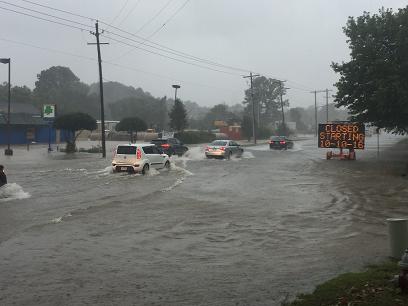Hurricane Matthew claims 20 lives in North Carolina

In Raleigh, the streets flood and pose a threat to the safety of citizens. For more information on how to prepare for a hurricane, visit the Red Cross website at redcross.org.
October 13, 2016
This weekend, Hurricane Matthew struck the United States with full-force. After devastating the Caribbean with hundreds of deaths, Matthew came to hit the East Coast. In total, it has caused at least 39 deaths across 5 southeastern states (Florida, Georgia, South Carolina, North Carolina, and Virginia). Thousands have been left without power and many people have been stranded. Delaney Winkler, a freshman, says, “My power kept flickering on and off, and a lot of my friends lost power completely.”
Over their fall break this weekend, UNCW ordered a mandatory campus evacuation, and all classes and sports were cancelled up until Tuesday, as Wilmington was hit with 70 mph winds. Other universities along the coast took similar precautions as well. Several school districts, including Wake County, cancelled school for at least a day; some even cancelled for the entire week.. North Carolina received a record breaking 18 inches of rain throughout the hurricane, and while the storm itself has passed, that does not mean we are out of the woods yet. Flooding remains a major issue as all of the rainwater is now making its way into rivers who simply cannot hold that much water. Junior Nate McDonald said, “The hurricane flooded my whole street; it came close to my front lawn.” The Lumber river overflowed and left 1,500 people stranded. People have reportedly been left on top of roofs and rescue teams are still working to make sure everyone is safe and taken to a secure location.
Preparing for a hurricane is key to keeping damage to a minimum. First and foremost, when your city/university announces that you need to evacuate for your own safety, do so at once; there are many different shelters open farther inland for people that live on the coasts. Check your insurance coverage to make sure it covers flood damage and take some pictures of your house to help with insurance claims. Also, make sure to stock up on basic supplies. The Red Cross says that families should have a minimum of 3 days worth of water and nonperishable foods on hand, along with at least 10 days of any medication you might be taking. When the hurricane is happening, make sure to lock all your windows and doors and try to stay away from any windows. Keep inside at all times until told otherwise; it may look like it has cleared up, but you might just be in the eye of the storm. If out and about, keep an eye out for flood warnings. Do not attempt to drive through flooded roads, as it can be dangerous. Remember, “Turn around, don’t drown!” For more precautions you can take, visit the Red Cross website at redcross.org.












